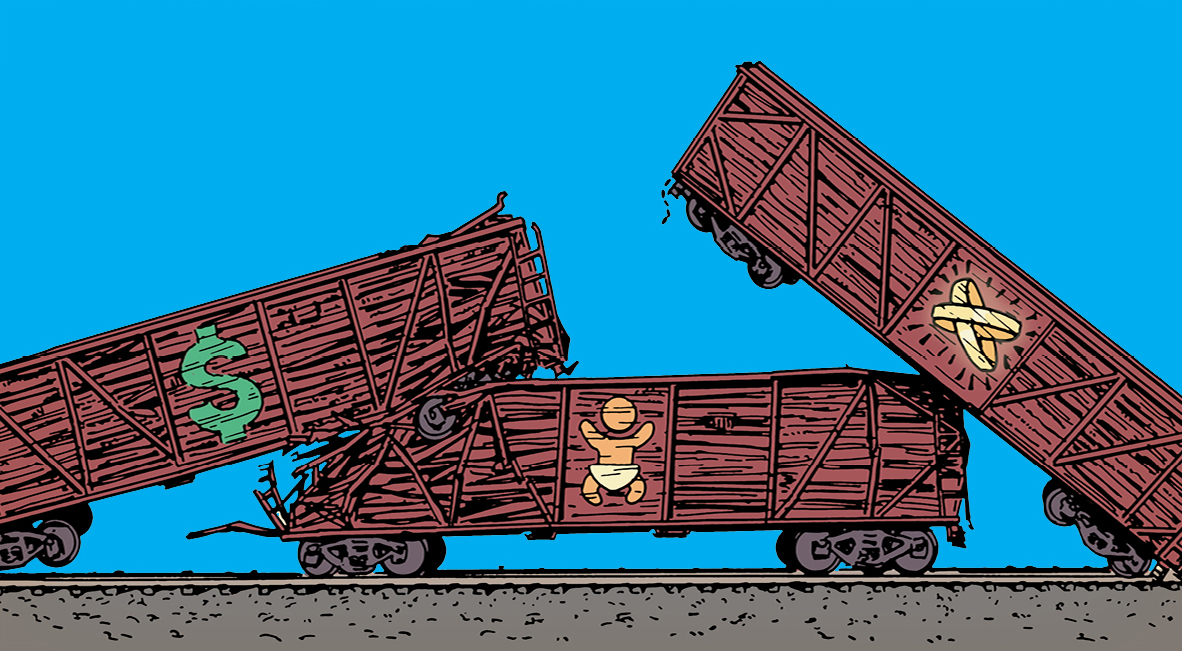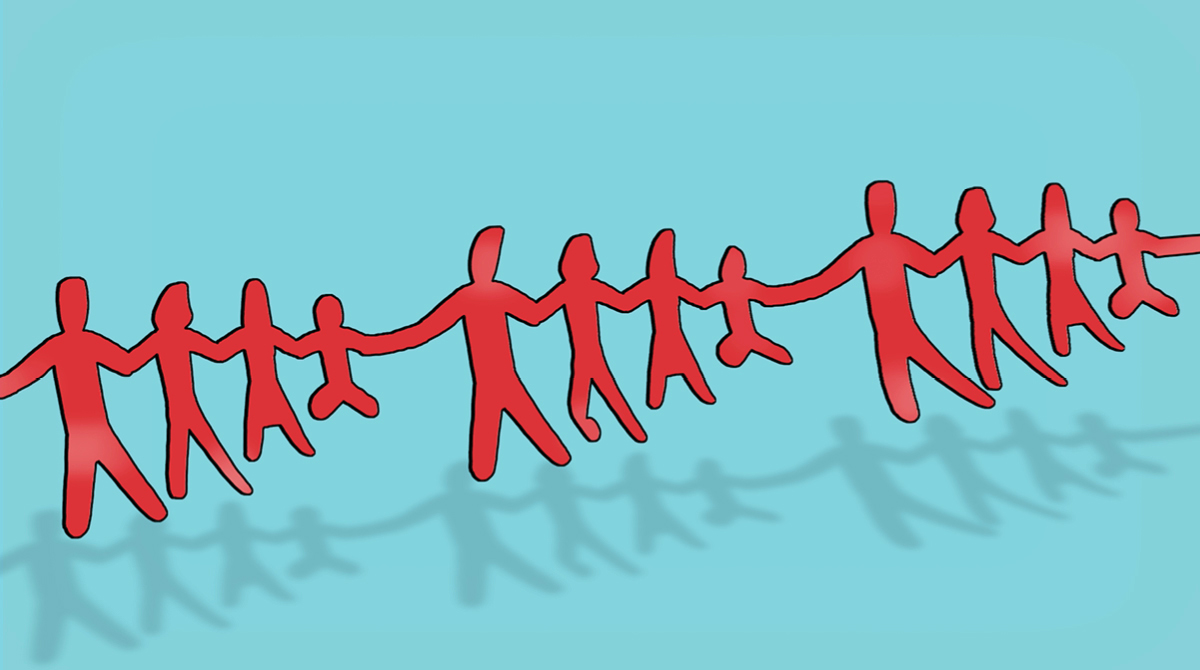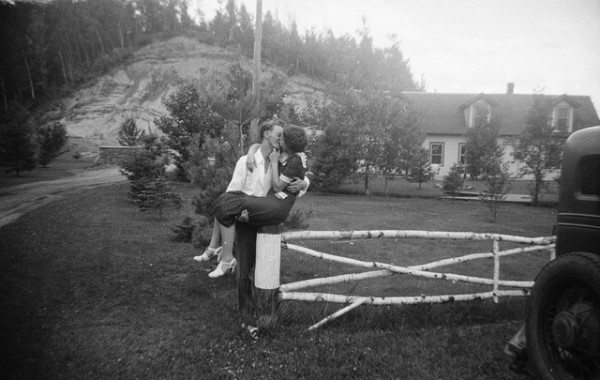
With our archives now 3,500+ articles deep, we’ve decided to republish a classic piece each Sunday to help our newer readers discover some of the best, evergreen gems from the past. This article was originally published in February 2013.
Expect a rollercoaster ride.
That’s all I can say. Climb into the car near the front of the rows, buckle your seatbelt, then grip the chrome handle in front of you. Clack. Clack. Clack. The car is nearing the top of the first high hill now. Get ready to raise your hands and scream.
The first time we were pregnant was 10 years ago. The very same day we first announced the pregnancy to friends, my wife, Mary, began to bleed. What a day of highs and lows it was. That morning, people were so happy for us, then that afternoon we stood at the front counter of an emergency room, our faces ashen. Mustering the lowest, most-controlled voice I possess, I said to the receptionist one short sentence I will remember forever: “I think my wife is having a miscarriage.”
It’s an odd thing about miscarriages. They just happen. Sometimes there’s an underlying cause that can be addressed, but often there’s virtually nothing that anybody—no medical doctor, minister, or magician—can do to prevent them. They occur in about 1 in every 5 pregnancies. Doctors will tell you that it’s the body’s way of cleansing something that wasn’t meant to be. There’s no rhyme, nor reason. Just mystery, and vagueness. Something to wonder about, but not understand.
Yet each one is heartrending. And a man finds himself in a unique spot. He’s often the silent sufferer, the one called upon to support and encourage and comfort. Yet inside he’s as equally torn up as his spouse or girlfriend, as unsure of what to do next, as grief-filled, discouraged, and aching. How can a man navigate this difficult season?
Mary and I spent four hours in the examination room. Mary lay on a gurney. I sat on a chair beside her. Doctors and nurses came by to draw blood, ask questions, write on forms, look, probe, touch, and talk. During those hours there were uninterrupted spells of quiet. Mary and I sometimes looked at each other, but it was hard to talk. We were sure we lost. There was just too much blood.
We learned a lot during that trip to the E.R. Normal gestation is about 40 weeks, which we already knew, but, technically, if the pregnancy ends prematurely, it’s called an “early pregnancy loss” up to about week 6, a “miscarriage” up to about week 20, a “stillbirth” up to about week 37, and a “premature birth” from then on (it’s called a birth even if the child dies). This was week 10 for us.
Toward the end of our stay, the doctor scheduled an ultrasound. I have often wondered why he didn’t do this first. I surmise he was convinced the situation was hopeless. But finally he did. Mary and I were emotionally pushed over the edge by then, completely exhausted, and anticipating a slew of sad phone calls to family and friends.
The ultrasound room was warm and dark and quiet. Then, to our complete surprise, the doctor cleared his throat. “I don’t know what to tell you, but there’s some other unknown reason for all the blood today.” He pointed to the monitor and grinned. “Because there’s your baby’s heartbeat. Strong and healthy. Your child is still alive.”
I will never be able to describe it. I could write until I run out of words, but I will never convey the emotion of hearing those startling and wonderful words. This is a rollercoaster experience, remember, this process of having children. Sometimes it’s best to just hang on for the wild ride.
We named that child Addy. Today she’s in fourth grade. Loves drawing and Barbies and reading. Just last night she sidled up to me on the couch and gave me a mischievous wink. “Dad—” she said, “what’s a horse’s favorite thing to put on his sandwich?”
I shrugged.
“Neigh-o-nnaise.”She whinnied like a horse, grinned big teeth, and added in her best Las Vegas comedian voice, “You’ve been a wonderful crowd. I’ll be playing here all week.”
That was our first pregnancy, the one where we nearly lost Addy. To me, that put all future pregnancies into perspective: it’s such a fragile thing to have a child. And when you see your child growing up, you can more easily imagine your other children, the children you’ve lost. Stay with me here, because there are huge highs and huge lows, like I mentioned, and it certainly hasn’t been all after-dinner jokes for our family.
A year and a half after Addy was born, my wife became pregnant again. This time, again, she started to bleed. We anticipated the worst. This time there was no unexpected, miraculous change of course. No heartbeat. Nothing. Not after the bleeding started anyway.
We had been so fortunate the first time around. This, now, was our dues paying, we figured. Somehow, seen from that perspective, it seemed easier to cope. We were pretty sure it was a boy, although we never found out the sex. In our minds, we named him Luke.
So that was our first miscarriage.
A year and half after that, Mary became pregnant a third time. Again, she started to bleed. We were moving to a different city when it happened. Everything seemed in such upheaval just then. There were too many changes in our lives to fully process. Again, we lost the baby, this time at 9 weeks. We grieved in the moving van on the drive to our new house.
For weeks after that, nothing seemed in its right place. It was a girl—that was our hunch anyway. In our minds, we named her Skye. Like the color of a warm summer day.
So that was our second miscarriage.
After that, we got serious. Really serious. More serious than we had ever been before. We went to doctors and specialists, and they put Mary on a hormone therapy. The therapy was our ace, we were told.
Sure enough, Mary became pregnant a fourth time, and everything went fine. Amazingly fine. Not-even-a-hiccup fine. Our son, Zachary, was born in 2008. He’s in preschool today. Loves soccer and bulldozers and Legos and chocolate Dilly Bars from Dairy Queen. He’s an amazing kid, a delightful blunderbuss of winsomeness and wit.
Three years later, Mary became pregnant again. We were so smug. We had the hormone therapy, after all. No way could anything go wrong. But it did. Mary miscarried on Mother’s Day, 2011. I hope this isn’t too much information for you, but we saw our child that time—partially developed—tiny and gray and still. In our minds, it was a girl, although we never found out for sure. I called her Macy, but my wife has always called her Nikki.
So that was our third miscarriage.
Here’s what I’ve learned over the years about how a man might handle a miscarriage. I’d never try to give anyone a “step-by-step plan” to coping, so I’d rather call these six notes I’ve made to myself about our miscarriages. Hopefully these principles apply to any man going through this situation. Hopefully they help you or someone you know.
1. You grieve.
And that’s good.
That sounds pretty basic to say, but I think some men overlook the simple fact that a miscarriage is a serious loss, and afterward, grieving is mandatory. Flat out, there’s no other way to cope except to grieve.
You and your significant other have been excited. You’ve been reading naming books, pricing cribs, checking out strollers, and painting your spare room. All that translates to excitement. And now the excitement is no more.
The famous psychiatrist, Dr. Elisabeth Kübler-Ross, outlined the 5 stages of grief—denial, anger, bargaining, depression, acceptance—and a man can expect to experience these in various forms.
Expect to grieve. Expect to feel lousy. Expect the world not to be all right.
2. You’re tempted to apologize.
But don’t.
Sometimes you wonder if you should have told people. Even if you should have allowed yourself to feel such excitement yourself.
It’s okay to have been excited.
It’s okay to have told people.
And, no, do not blame anyone for the miscarriage. Including yourself or your wife. It is no one’s fault.
When Mary was a few weeks along while pregnant with Macy, I was right in the middle of releasing a new book. I was so stinking proud; I even announced our pregnancy during a radio interview. I wanted the whole world to know. After we miscarried, I felt so stupid for not keeping my cards closer to my chest. What an idiot I had been. That’s what went through my mind.
It was my mother, actually, who wrote me a short note after the miscarriage that said, “You celebrated the start of a new soul, and you invited the world to celebrate with you. Never apologize for inviting people to see something of wonder and awe and profound beauty.”
3. Your job is to love.
Hardship can either rip couples apart or bring them closer together. Decide early on that you and your wife are on the same team, at least as far as it depends on you, regardless of what difficulties you encounter.
It’s particularly important to support the other grieving partner during a miscarriage. Let her know that no matter what happens—whether you go through another miscarriage, or you can’t get pregnant, or you decide to do fertility treatments, or you hope to adopt—you are going to get through it together, and you’ll work through everything together, come what may.
As a man, be the first to take the initiative here. Reaffirm your love for each other during any time of sorrow. Let her know you’ll be at her side no matter what.
4. You commemorate, or not.
Mary and I have known couples who’ve miscarried and held memorial services afterward. We’ve never done that ourselves, but it seems fitting, particularly the further along a pregnancy is.
Other couples we’ve known have planted trees in commemoration of their lost child, or had plaques installed on park benches. Some parents write letters to the child. I say, commemorate anyway you wish. Or don’t. Whatever feels best for you as a couple.
After our third miscarriage, because our children were of the age by then where they knew about the pregnancy, we decided to hold a family celebration day. We bought a fancy doll for our daughter and a cool toy truck for our son. We went out to eat at a restaurant, and had a movie and ice cream night later on. We explained to our kids why we were doing this. We wanted to remember the child with joy. And, frankly, we wanted to cheer ourselves up.
Whatever works best for you.
5. You don’t replace the child.
People sometimes say things like, “Well, just have another kid. Then all will be better.”
No. That might be part of your solution as a family, and people are well-meaning in offering their consolation, but having another child will never replace the child you lost.
That child will always be autonomous in your thinking. A separate being. And should always be thought of that way.
6. You keep going.
Each couple needs to decide what it means to “keep going.” For some, it means they’re done, but they won’t be defeated—at least not forever. For some, it may mean some serious planning and adjustments. Infertility clinics. Adoption.
Having more children doesn’t lessen the loss you felt at having lost a child. But it can be part of the solution. Part of the overall process.
How did we keep going? After five pregnancies and three miscarriages, we were convinced we were finished with trying to have any more children. We waited a year after our last miscarriage, just to make sure, and every ounce of common sense told us we were done. We were getting older. The hormone therapy wasn’t a sure thing. At the end of that year we were certain. I made an appointment to have a vasectomy.
They make you have a consultation first, those vasectomy clinics. I had my consultation, then, on the drive home, I felt so uneasy, so torn in my spirit. I wasn’t afraid to have the procedure. In fact, it’s again on the list of things to do. But we were wrong. We simply weren’t done—that was the big thought that kept coming back to me.
Four weeks later, Mary was pregnant again.
We’re nearing the end of that pregnancy right now. It’s a girl. We know this for sure. So far, doctors say, everything looks just fine.
We haven’t decided on a first name yet. But both Mary and I are sold on a middle name. It’s a reflection of the one factor that’s kept our heads from splitting apart during our wild rollercoaster ride of having children.
I might add that I believe in science. In the best doctors and the newest procedures and the slickest hormone therapy procedures. I believe in everything medicine can do to prevent miscarriages.
But, still, her middle name will be Faith.
_______________________
Marcus Brotherton is the author of numerous books, including his latest, Blaze of Light, a biography of Medal of Honor recipient Gary Beikirch.






